ATW90 – Thailand Part 2. The rise of Buriram United
I thought my journey from Myanmar to Buriram might be a problem. Although it was two flights with a single airline, I would still have to pick up my luggage while changing, check it into the connecting flight and go through immigration in Bangkok. Fortunately, my morning flight from Yangon was on-time and two hours was easily sufficient to arrange the change.
On the Bangkok to Buriram flight, I saw something which I must say it is unusual generally, but especially so in Asian football. There were a small number of passengers wearing football shirts and these were not the shirts of a club from thousands of miles away. These are the shirts of Buriram United, the club I intended to see that evening.
It is a sign of the remarkable story of Buriram United, who are already the most successful club in Thailand, and by some metrics, could be considered the best on the continent. To try and unravel this, I need to look back into the development of the Thai Football League, which is one of the best demonstrations in Asia of what can be achieved.
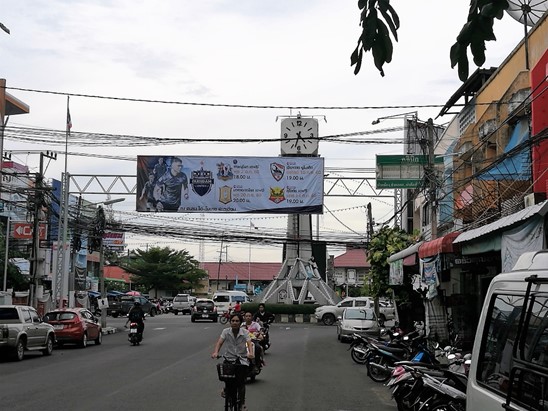
My first football games in Thailand were in 1990, part of a few trips for work that I made to the region at this time. I was based close to Rayong, and my first game was on nothing more than an open field with a tent. This was the final of a local provincial tournament. The scale of development is such that the field is now under a sports hall, while close by, a new stadium has been developed.
All football in Thailand at the time was tournament based. Inter-provincial tournaments played between different areas of the country, while club competitions were played by clubs within a smaller area. One only ever heard about the Bangkok area club, with the Kor Royal Cup being recognised as the Thai Championship. I saw the final of this in Bangkok in June 1990. The crowd was sparse, not into four figures. All the clubs in the tournament were associated with companies or government department around Bangkok. My final saw Port Authority of Thailand beat Thai Farmers Bank 2-1 a.e.t.
In 1996, a league was started, but this was still an all Bangkok institution. A second parallel league was started for provincial teams in 1999.
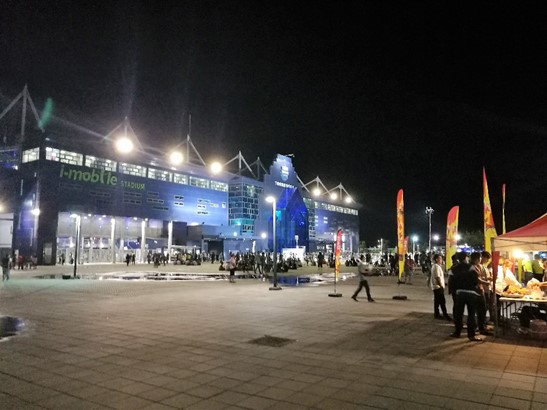
Outside the I-mobile or Thunder Castle stadium pre-match.
Changes really started in 2005, when the top two provincial teams, Chonburi and Suphanburi were added to the Thai League. This did not create a national league, as neither was that far removed from Bangkok, but at least they were outside the metropolitan area. Chonburi finished mid-table, while Supanburi fared poorly and would have been relegated in further reorganisation had not taken place.
Technically, the two leagues merged, but this did not mean a great deal. There were now four clubs from outside the Bangkok area, thanks to the promotion of Royal Thai Police and Royal Thai Navy, who both used stadiums in neighbouring provinces.
A year later, the club of the Provincial Electricity Authority, PEA decided to head away from the capital moving north to the ancient city of Ayutthaya. With increased crowds, they won the title, but their stay in Ayutthaya was to only be for two seasons. After a second, less successful season the club was bought out by politician Newin Chidchob.
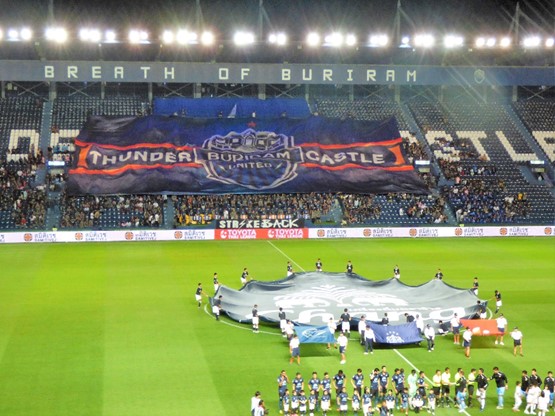
Chidchob had been a minister in Thaksin Shinawatra’s government, but had avoided the fall out when Shinawatra fell from grace. He went on to be critical of his former leader when groups that wanted him returned to political life were protesting early in 2009.
Chidchob moved his new club to the city of Buriram, which was where his political power base was. Buriram is a fairly nondescript city in North Eastern Thailand. By bus, it takes around 5 hours to get to the capital, (when I tried, it was nearer to six, but the last hour was all within metropolitan Bangkok as the weather and traffic combined to delay all).
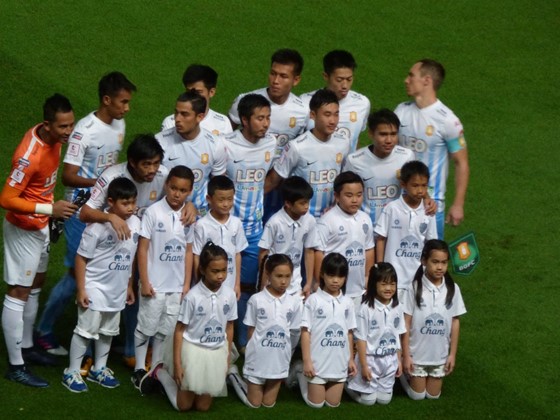
Bangkok Glass FC – proud to wear my name, (or that of a very poor lager beer)
There was an added confusion to football in Buriram, as also in 2009, Buriram FC were founded and took a place in the regional league, playing at the Buriram Rajabhat University Stadium. Not that Chidchob was going to see this as a rival, the owner of the other club being none other than his wife, Mrs Karuna Chidchob.
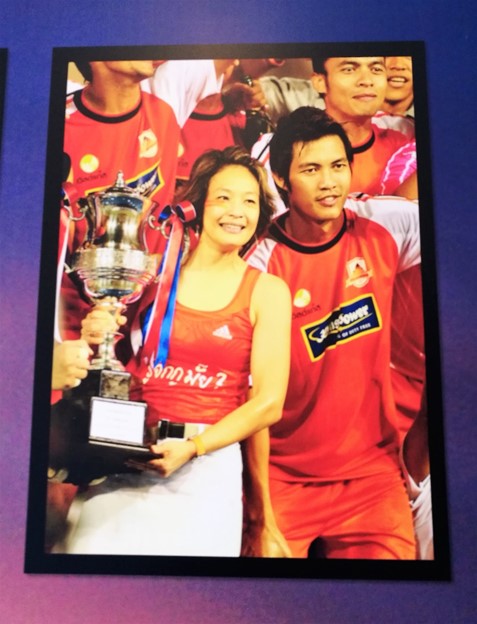
A photo from the public display at Thunder Castle – Mrs Chidcomb holding the trophy after Buriram FC were promoted. Probably at one of the last games before they merged with her husband’s team
The stadium that Newin’s club had to use when moving to the city was the provincial stadium, and is 7km from the centre of town, but with promotion, Buriram FC soon had to move there as well.
Since moving to Buriram, Newin Chidchob’s club have won 5 out of 7 Thai League titles, four Thai FA Cups, Five League Cups, four Kor Royal Cups (now the Thai Supercup) and two Mekong Club championships. The Mekong championship is competed for by four or five South East Asian Champions. It has ran for four seasons, with Binh Duong (Vietnam) winning the inaugural cup (no Thai entrant, all games in Vietnam), and Thai teams winning the rest. Buriram’s biggest rivals, Muang Thong United being the current holders. Buriram have also reached the knock out rounds of the AFC Champions League once, when they reached the quarter-finals.
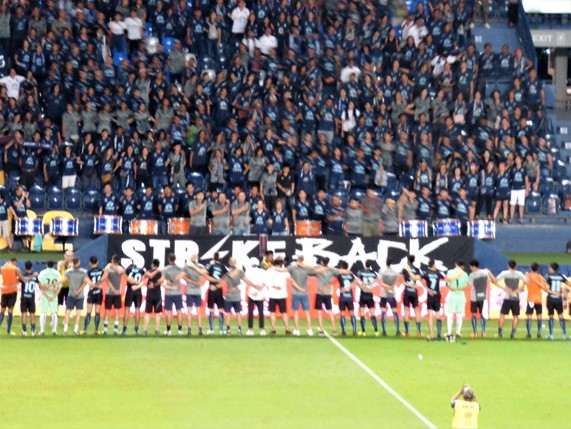
Game over – so its time to greet the fans.
Meanwhile, Buriram FC were also going from success to success. Two promotions had placed them one level behind Buriram PEA in 2011. The 2011 season was remarkable for the city, as both teams won their divisions. This presented the potential for the city to have two teams in the top division, with a husband and wife partnership as the two club presidents.
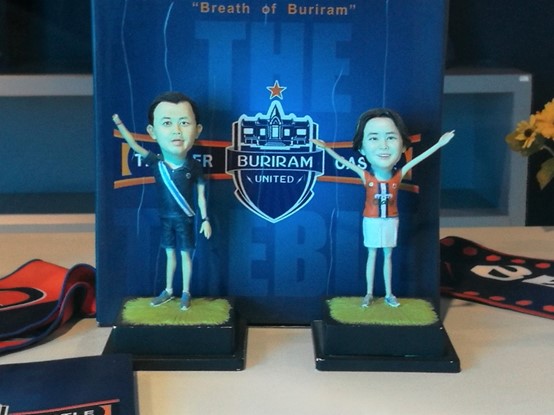
I cannot see many club owners doing this, but in Buriram you can buy dolls of Newin and Karuna Chidcomb, wearing the colours of their two teams prior to the 2011 merger
Also, during 2011, they opened the new stadium, known as the Buriram Stadium, the Thunder Castle Stadium, or the (insert sponsors name*) Stadium. (*I-mobile in 2017, Chang in 2018). The Stadium was built in 256 days, which is proudly proclaimed as a record for building a stadium (certified by FIFA, no less, as FIFA love to accredit a record that cannot be proved or disproved).
Of course, it would not be acceptable for his and hers football teams to play in the same league, so for 2012, a new name, Buriram United appeared in the top division. In Thailand, the moving of rights for a club in a division is allowed. After all, that is how PEA moved to Buriram in the first place.
The Chidcomb’s managed to sell the club rights to the furthest point they could find from Buriram, while remaining in Thailand, and so Wuachon United were created, sharing a ground and at least partial ownership with Songkhla FC, a team one division lower. Newin Chidcomb said at the time that this was to help football in Southern Thailand, a region that had never been represented at the top level. One can be certain that if this is the case, then he also had something to gain in literally selling the club south. I just cannot specify if this was for political advantage, economic advantage or a mixture of the two.
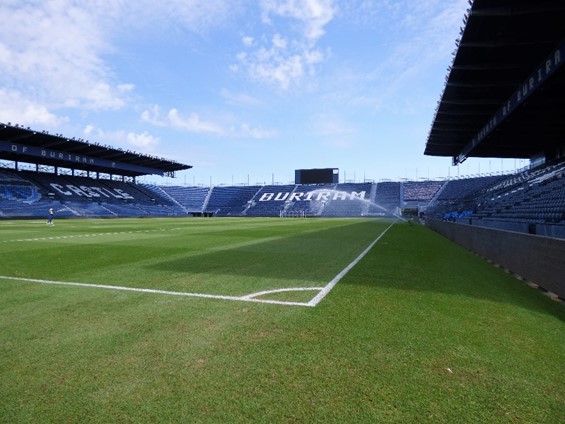
The name Wauchon existed for one season only, as Songkhla FC were relegated and the club owners decided to merge the two as Songkhla United. Songkhla United managed a further two seasons in the top division, and then three at the second level. They lost 1-0 in the match I saw at Trat, which helped both in securing their relegation, and making sure Trat just escaped. For 2018, they have failed to gain a license for the third level, and hence drop an extra step.
Meanwhile Chidcomb’s development of the site around the new stadium has increased. There is a small retail area, a modern hotel, the club superstore and a motor racetrack. The oddest of the features is a small castle, which is a replica of the ancient Hindu stone castle at Phanom Rung. The castle features on the club badge, along with two lightning bolts, a remembrance of the club’s origin as PEA.
I went back the day after the match to talk to Bubet Suppipat about the club, and was surprised to see a steady stream of tourists coming into the ground to take a look around, and see the entrance to the dressing rooms and take a selfie in front of the stand. I talked to a few of these and many were up on a trip that took in just the one game, as they came from towns in other parts of Thailand.
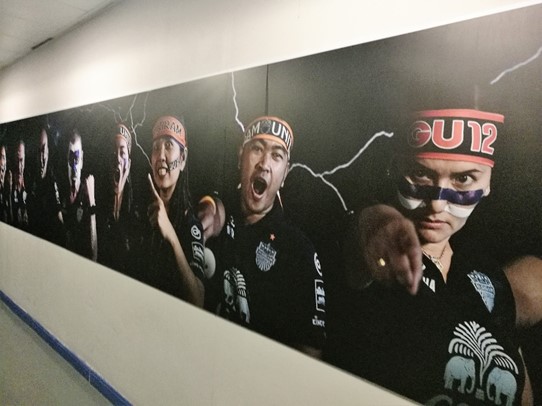
Coming to get you? The passage leading to the away dressing rooms!
Not quite the tours on offer at Old Trafford or the Bernabeu, but one can see that the club is selling itself as a destination. The club name is highly prominent around the town, with posters and a banner selling the fixtures.
If the objective is to use the sporting facilities to put the city’s name on the map, then it appears to be working. If you look on travel sites, such as Wikivoyage, then Buriram is listed as a “fairly nondescript town”, best utilised by tourists as a base for visiting ancient sites (such as Phanom Rung) in the area around it. These are well spread out, so time and transport would be required. I can confirm that there is not a great deal to see in the town itself, although it is appears to be neat, clean and relatively prosperous. What no visitor to the town cannot miss is that this is the home of Chidcomb’s ventures – the football club and the racetrack. You cannot avoid seeing posters advertising these.
While in the town during the day, I spotted a European couple who had been on the bus from the airport with me. While they had no thoughts of football before arriving, they were now considering going to the game, (they may well have been put off by the 4 km to the stadium and lack of public transport).
Bubet Suppipat, who also goes by the name Golf met me at the stadium after the match. For a while, I thought the meeting would not take place. It was originally scheduled for 10.00, but actually happened after lunch. Fortunately for me, as I have mentioned, the site has a few cafes where I could find some lunch. The delay was caused by an impromptu meeting requested by Newin Chidcomb. Clearly a request that cannot be ignored. Golf had football administration experience before coming to Buriram, and had been chief operating officer of Lao Toyota, the leading club in neighbouring Laos. He confirmed to me that Laotian football is far behind most of the South East Asian countries, (but of course, it is still somewhere I would like to visit).
After discussing the history of the club with me, we went on to the current financial situation. He did not know the exact budget, but thought it to be around 200 million baht. This is equivalent to about £4.5 million, and was ten times the figure mentioned by Rayong in the next division down. What is remarkable though is not the size of the budget, but the fact that the club is claiming to be breaking even. The basis of this is the merchandising operation, which apparently raises 40% of the clubs income. The city of Buriram has a population of around 30,000 – but the football club has sold around 700,000 football shirts in one season, and they were at pains to points out that this is only part of the operation, the figure does not include other parts of the kit, T-shirts, and other souvenirs. A similar portion of the budget comes from sponsorship, with the brewers Chang being named on the shirts and taking over the naming rights at the stadium for 2018.
With the rest of the budget covered by matchday income and the central allocation, (from the FA of Thailand, covering income from the TV contract, and league sponsors Toyota), it appears that Mr. Chidcomb no longer has to put money into his club to keep them at the top of the league.
Golf also mentioned plans to float on the stock market. When I expressed a need for caution, based on the poor record of stock market floats for football clubs in Europe, he corrected himself. It is not the football club itself that may be capitalised on the stock market, but the merchandising arm.
The stadium is straight forward, a single tier of seats running up to an even height all around, albeit that the lowest seat level being much too close to ground level. There is no track, so you are reasonably close to the pitch. Roofs on both sides, open behind the goals, sight lines are good except when too low. Unusually, the major side of the ground, with executive boxes, etc is on the East of the stadium, not the West. They do not tend to start matches before sundown, so this is less important.
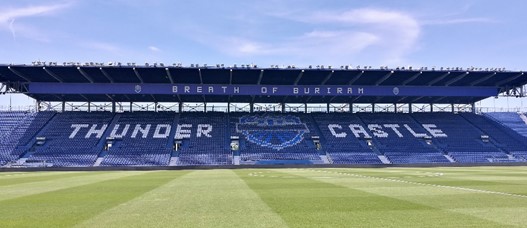
A near square 32-page programme was sold for 20 Baht. It is a glossy affair, well produced but would still be short on information even if I could read Thai.
As far as the match was concerned, I found it dispiriting. Buriram won with a goal in the 90th minute, a header from a Brazilian player Coelho getting his head to a free kick sent on by Suchao. The free kick was won by their other Brazilian, Diogo who spotted the place where he would clearly get fouled if he ran through. Throughout the game the home side relied too much on these two players, who were generally poor until the final ten minutes, when they were clearly trying to set each other up for the goal.
It was the rest of the cynical play that I found worse though. Bangkok Glass have a talented young Thai player called Apisit, who simply attracted fouls until he went off injured. The injury was caused after he had won a corner. The Buriram player who had knocked the ball out then simply pushed Apisit into the advertising hoardings as hard as he could. At this point Apisit had has knee bandaged, but carried on. It took at least three more hacking fouls before he went off.
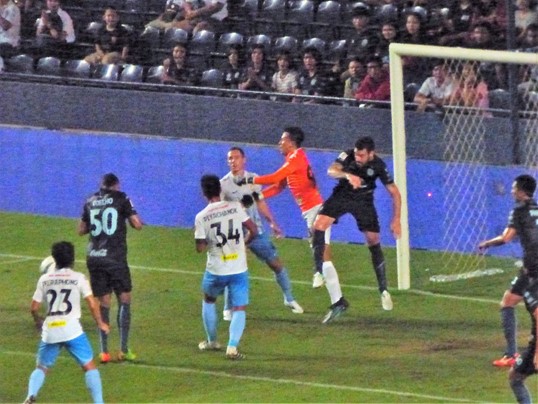
On a number of occasions Glass tried to run the ball through the midfield in counter attacking moves. As there was a risk of getting clear, the player would generally be fouled or pulled back by the Buriram captain Jakkaphan – I counted at least four occasions where this would earn a yellow card in Europe before he finally got a booking late in injury time.
There were about 10,300 people watching. This is down on the average attendance for the season by around 3,000, but not entirely unexpected for a midweek game
One final thought of thanks to the good people at the football club, as I mentioned, it is difficult for a foreigner with no knowledge of the area to find their way back from the ground – at least without their own transport, but the club arranged to get me into town both after the match (when I shared with one of the journalists), and after my discussions the following day.
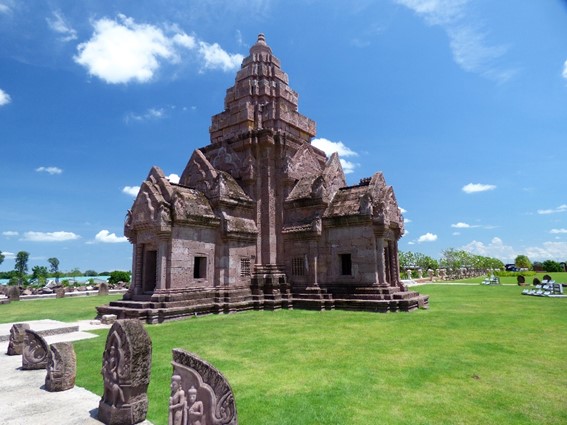
The replica temple in the grounds.
Once in town, I had a good wander around, making the most of the last hour before sundown. I found the university stadium by chance, and there was actually football taking place as I passed. Naturally I stopped to inquire what was going on. The match had four match officials, so it was the fourth who tried to update me. The game was clearly competitive and it was described as fifth level. My later investigations showed that it was not part of the end of season fifth level competition – but I know there is a qualifying competition for this, and so these could have been fifth level teams, playing in another competition
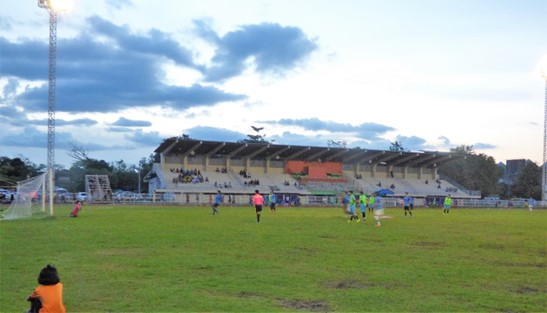
The Rajabhat University stadium, once used by Buriram FC
On Friday, I took the bus south, starting in the bright sunshine of the North East, but soon travelling under grey skies before hitting the outskirts of Bangkok where the weather practically brought the suburbs to a halt. It was to be the story of the weekend
The Thammaset University Stadium is set on campus, about 40 km north of Bangkok centre, it is a 25,000 all seat stadium, which looks a little like a small brother to the national Rajamangala stadium, there are only 12 rows of seats in front of the scoreboard at one end while the numbers increase as you move to the centre, with around 50 rows opposite the centre line. There is cover on both sides, but not behind the goals, although the cover does not lean out far enough to protect the front rows on either side.
When I left the hotel, the skies were grey, but it was dry after a short lunchtime storm. As we headed north, the driver pointed out the “heavy rain clouds” ahead. In Bangkok, heavy rain is defined as such that you cannot see out of the car windows, even with the wipers going full pelt.
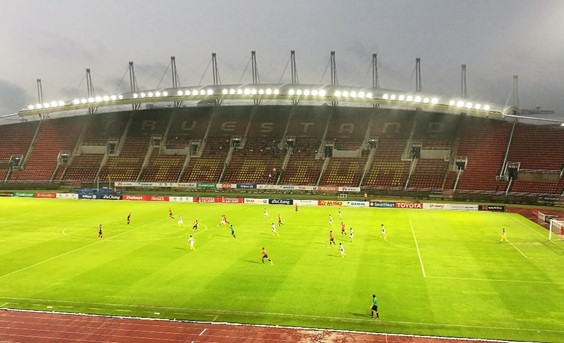
By the time we came off the elevated tollway, about five miles from the ground, the sideroads are completely flooded. You can see mopeds struggling to pass through water around 6 inches feet, and people who have taken their shoes off gingerly trying to walk through, not being able to see the ground.
I am thinking about what the alternative would be if the game is off, and whether my taxi can be held to take me onwards, but when I arrive, the ground is only mildly waterlogged. You can still see the grass, and the match is on. As it happened, my “second choice game” was postponed
The unlikely named Super Power Samut Prakan are the visitors today, while Bangkok United are the team that plays at Thammaset. It is an uneven contest, as United are near the top of the league and Prakan are rock bottom, with just one point from 28 games.
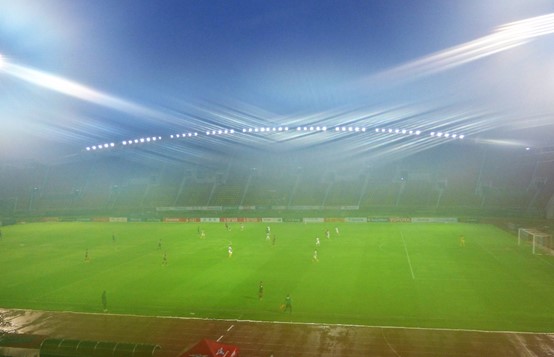
United had lost to second placed Muang Thong United on Wednesday, which left them six points behind second place, and 12 behind the leaders Buriram. So despite the comment from coach Alexandre Polking at the post-match press conference that he wants to win every match, and that he is not prioritising the cup, seven changes from Wednesday’s game suggests that players are being rested. One could say that this paid off, as they easily progressed through the following week’s cup game, beating mid-table Port by 5-1. United ended up reaching the cup final, before losing to Changrai United.
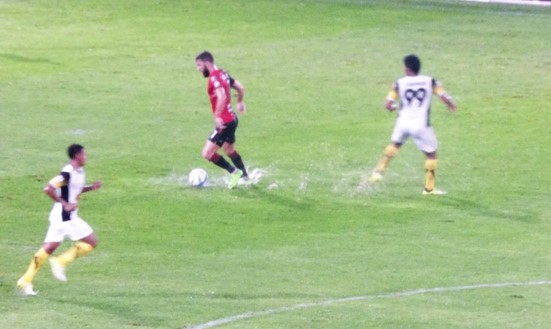
The combination of the weakened home side and a playing surface where every bounce caused a splash, and where players did not dare to take a dive as they were not provided with breathing equipment gave Samut Prakan some hope in the first half. Even a goal midway through from Dragan Boskovic did not mean they gave up, and just before the break they managed to get the ball into the net, but it was ruled offside
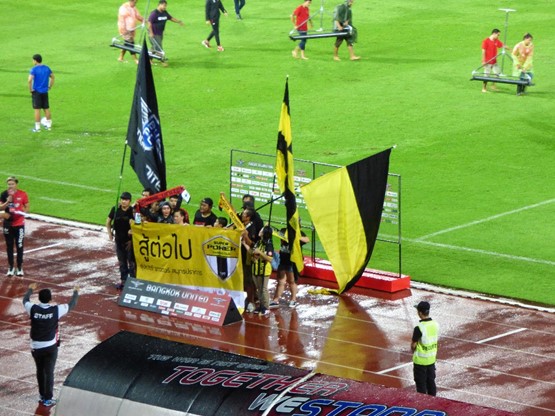
Supporters from both clubs get to show their colours during the break
In the second half, the rain was slowing and playing conditions were improved. The half time period involved much sweeping water off the surface. This allowed Bangkok United to feel a little more assured and to take control. Mario Durovski hit the second on 63 minutes, and then Alexander Sieghart added the third. Sieghart is listed as a Thai, he has a German father and played for Bayern Munchen II and Unterhaching before returning to the land of his birth.
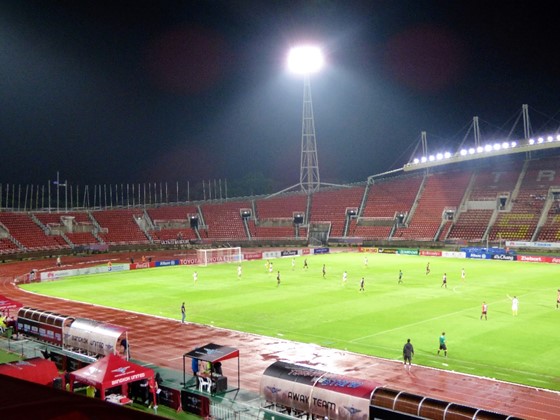
A final goal, two minutes from time was credited to Mika Chunuonsee, (born in Bridgend, and formerly of Bryntirion, Neath and Afan Lido, Welsh mother, Thai father). However, his shot actually hit the bar and came out, hitting the keeper on the back before rolling in, so in my listing it has to be an own goal.
Programme was slightly smaller than A5 in presentation, but then unfolds into a single sheet of paper, nine times the size. One side has text, the other has a player poster.
The crowd was 819. This was to be the lowest turnout at the club for the season, thanks to a combination of weather and the failure last mid-week. After the game, I was fortunate to discover that the club runs a free fan bus from central Bangkok, and I was whisked back into town on this. Talking to a German supporter of the club, while on the bus, I was invited to book a place for Wednesday’s cup game, but had to decline as I was going to be back in England by then.
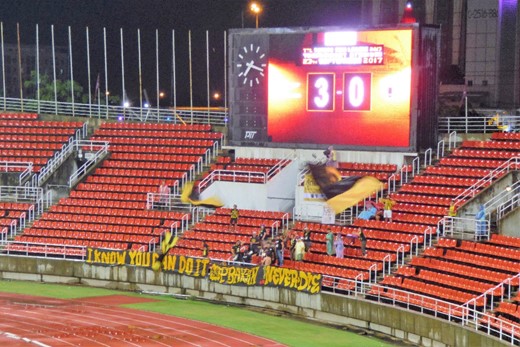
Having braved the rains, and facing certain relegation, the Samut Prakan fans can still wave their flags. They finished the season just 17 points behind the second bottom team, 30 off the mark required to avoid relegation
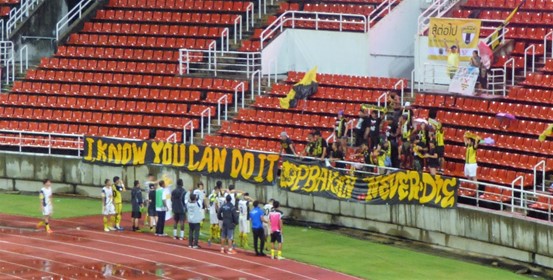
The players show their appreciation of the loyal band at the end
While seeing a low crowd at one game is not a problem in itself, the league will be concerned that the attendance for the whole season were 15% down, and that the 2016 season in turn was well below the leagues 2015 figure.
Apparently, the free fan bus also runs to away games, even if they are a nine-hour drive from Bangkok.
I only decided on my Sunday action on the day itself. Even the evening before, when I was doing some of the research, I had not decided whether or not to go to some of Thai Amateur games, and which ones to go to. I knew the Thai League had a 1-1-2-6 pyramid, with the top four divisions being professional, and the next two being semi-professional.
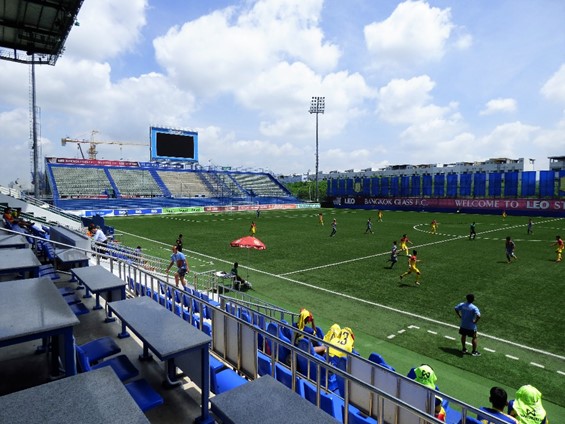
Sunday Morning, too early!!. The Leo Stadium staging fifth level games in the Thai Amateur League
The Thai League website also shows a fifth level, the Thai Amateur League. From this I discovered that there were matches due in some mini-leagues, that had started the previous week. Eventually, I managed to discover that the fixtures were being put out on a facebook page, but in an image format. This meant I could not use any automated translation engine on them.
It was clear that the matches were being played in a single venue each Sunday, with three matches on a day, using 10.00, 13.00 and 16.00 kick off times. The venues were not always the same from week to week, and I had to wait for the fixtures to appear on facebook.
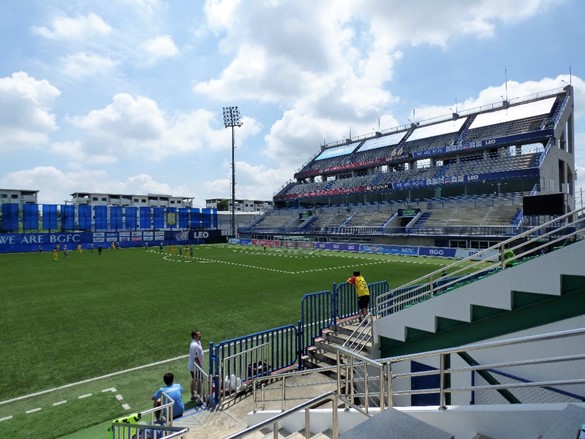
I showed them to some journalists at the Bangkok United game. It was clear none had covered this level of football, but I had already worked out that there 12 leagues in operation, and that two of the areas were Bangkok and Bangkok Perimeter. From here I gathered that the stadiums being used this week for the Perimeter League was the Leo Stadium, home of top division Bangkok Glass, while for the Bangkok League, it was the Thammasat Mini-Stadium. While I could confirm that this was on the university complex with Bangkok United, no one knew exactly where.
The good thing was that these two were not far apart, it would be easy to travel from one to the other within the one-hour interval.
I also tried to find out information about one of the other leagues, with the thought it might combine with Chonburi’s league game, but here the information ran out. Even those who could read the language could not point to the location on a map.
As I awoke quite early, I decided to go for it, based on what I knew. So, my first stop was to be the Leo Stadium. I had always been quite eager to get to the stadium bearing my name, and were disappointed that I was in Thailand during a weekend they were away from home.
So at 9 a.m., I was out of the hotel, briefly heading into the metro station to use the ATM, and then asking a taxi for the Leo Stadium
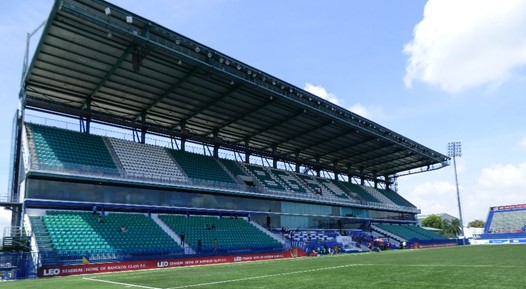
This was quite straight forward, and I arrived at the ground about 15 minutes before kick-off, where no admission charges were being requested, and I managed to obtain the team lists in Thai quite easily.
The teams were Romklao United, a student team based at the Kasem Bundit University, and an Air Force team – google translate puts the name as Department of Air Marshal. The Leo Stadium is an unusual three-sided affair, one of the long sides is not used, with a three tier stand behind one goal, a two tier along the side and a single tier behind the other goal.
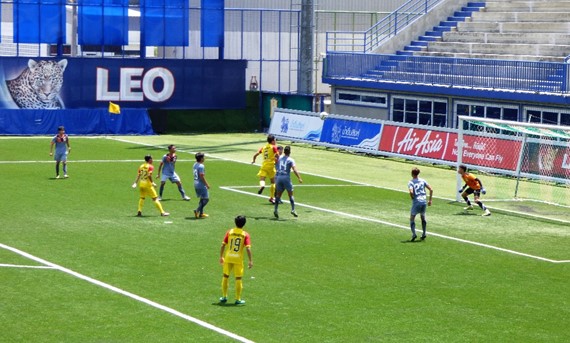
The individual players of the two sides were very good on the ball, but very poor off the ball. There is a lack of tactics or vision and the defences reigned. I though the Air Force team had done enough that they may nick it near the end, but then a silly foul in the middle of the field left them down to ten men, (it was a straight red as well), and changed the game dynamics. The students had the better of the last 20 minutes, but could not prevent the game from serving me up with my first draw (and hence first goal less draw) of the season.
On to Thammasat, no problems in getting there and none of the flooded roads of the day before. The advice I had been given was to ask directions from the University gatehouse. Considering that on the day before, my taxi driver had difficulty finding the big stadium, this seemed sensible. Naturally the driver would not do this, drove a while onto site, then asked someone, who said right at the end of the road and then left. In typical taxi driver style, he considered the second turning to be not worth his while, and drove off 400 metres in the wrong direction, turned around and then did it right. We still only got to about 200 yards away when he again decided he was lost, and could not see anyone to ask. I gave up at this point, paid him up and walked over to the building, where I was immediately and accurately directed to the mini stadium
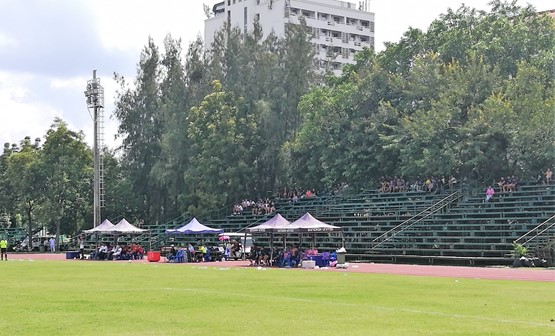
It is a grass pitch with bleachers behind it, the only shade and cover provided by trees overhanging, and by three gazebos – one for each team, and one for the officials. I was invited to share with the officials
The individual players skills in this game were less than that in the earlier one, the lack of vision and movement off the ball was the same. The teams now were Rajdamnern and Tokio Bluearmy. The spelling Tokio is correct, it is a Thai footwear company. There is nothing Japanese about then, although the coach does look like a retired Sumo wrestler, (pot, kettle?). I thought that I was getting my second scoreless draw of the day, especially as while Tokio seemed to be on top. Twice Sarawoot got clear with only the keeper to beat, and beat the keeper both times. The first was wide, the second hit the bar.
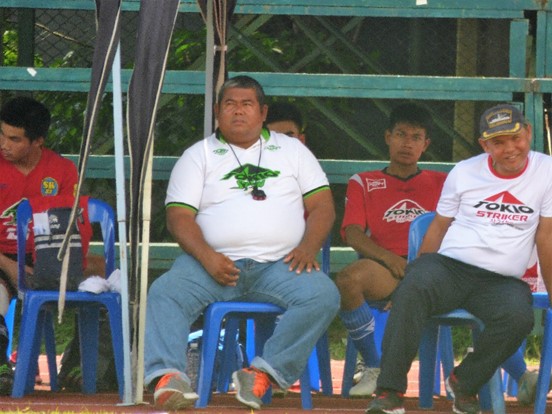
Just to show, I am not making this up!
But then with four minutes to go to the added time board, Srichai found himself clear for Rajdamnern, and managed to beat the keeper without missing the target. Three minutes later, the same played passed a defender with a clever flick and made it two.
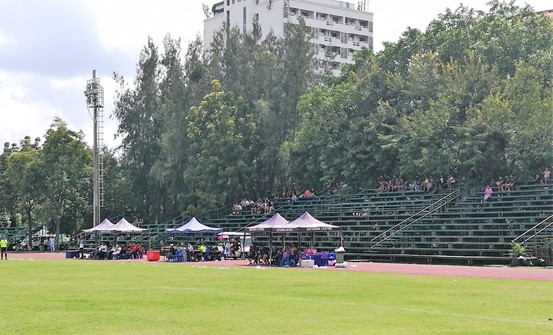
The attendances for the two games were just 30 and 50 respectively, although this included a drummer at the second game.
I made my way back to the central road, but the first taxi I stopped would not consider taking me to Minburi, despite this being a good fare to claim, it was a fair distance from where I was standing. Some taxi drivers on these trips won’t take you as they don’t want the hassle, but quite often it is because they just do not know where you want to go. Unfortunately, it turned out there were not many free taxis on the road within the university, but as I was waiting, a minibus stopped. It was the Rajdamnern team, on the way back to their base (wherever that is). They took me to a more major road where I could more easily find a taxi. It appears that there are no dressing rooms at the mini-stadium. I saw one of the match officials get on a bike and cycle away still in kit.
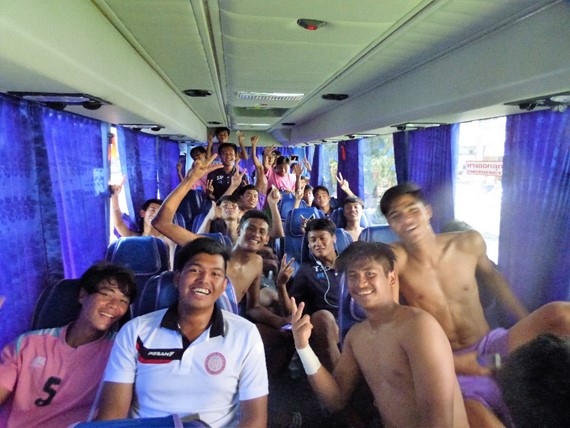
It took a couple of goes to find a taxi to take me to Minburi. This is the home of Thai Honda FC, and was close on to a one-hour drive from my position in North Bangkok. He phoned home to ask someone to look up directions to the 72 Anniversary Stadium. It did not really help and he still got lost more than once. I was trying to update him with the map on my PC, which I could not update offline, but could pan around a little, once we had got close enough to spot the stadium from the main road – still over two miles away I think. If you tell a taxi driver not to take a specific road, because my map says it doesn’t go through, he will of course try it, stop when he sees someone, and then head back when they confirm my feeling that we need to take the next turning.
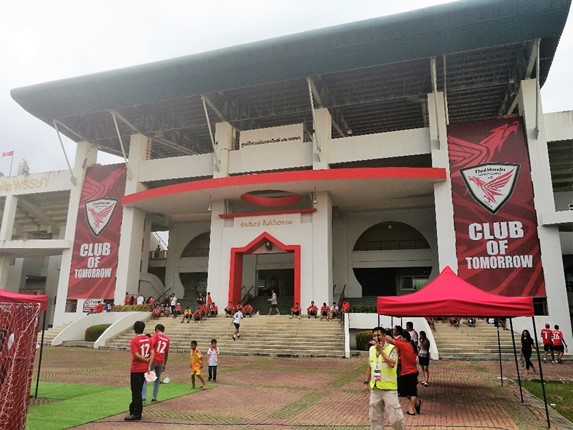
The 72 Anniversary Stadium is quite interesting. The choice of slogan, “Club of tomorrow” is displayed with much aplomb as you enter the ground. Sadly, this is not likely to be true, as they were relegated at the end of the season – and administratively they are still about two days before yesterday. On entry, I was given my accreditation, and a slip of paper allowing me to access internet from the Press Room. So, I asked where the press room was? It was just behind the girl who gave me the card, but I was sent in completely the wrong direction, after which I was told they did not have a press room at all. Still, one gets there in the end. There is no viewing from either end of the ground and one side is just a raised concrete stand with concrete seating. The other side is similar, except that seating has been installed in the central section which Is under cover. There is a track around the pitch, but at least the elevations are good.
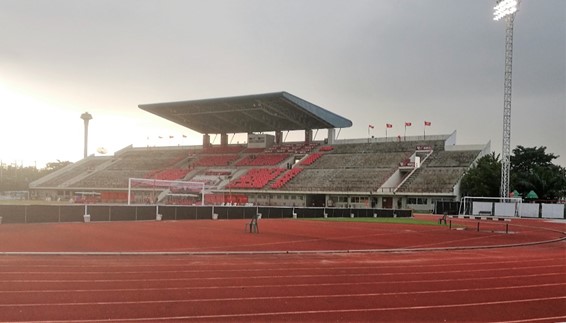
From the press room, I have a view onto the pitch and the stands, the weather was good when I arrived, allowing me to take a couple of ground pictures of the empty stadium, as I watch from comfort,
30 minutes before kick-off time, it starts raining. Heavily
20 minutes before kick-off time, the pitch is completely waterlogged
At kick off time, it is put back by one hour
45 minutes into the hour, the rain stops
One hour after kick off time, the referee goes for a paddle, and says we will kick off in 30 minutes
Five minutes later, the game is called off.
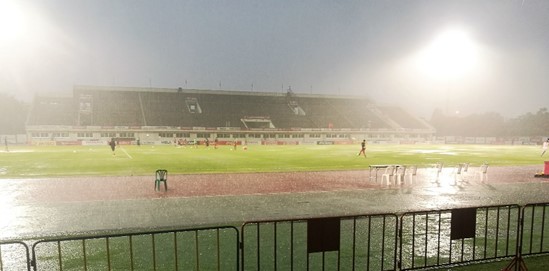
At some time during the wait, we were treated to an impromptu display of support from a small group of home fans with the name of the club emblazoned across their chests. Fortunately, it will wash off – and if they went to stand with the majority of the fans, it will have done before the game was called off.
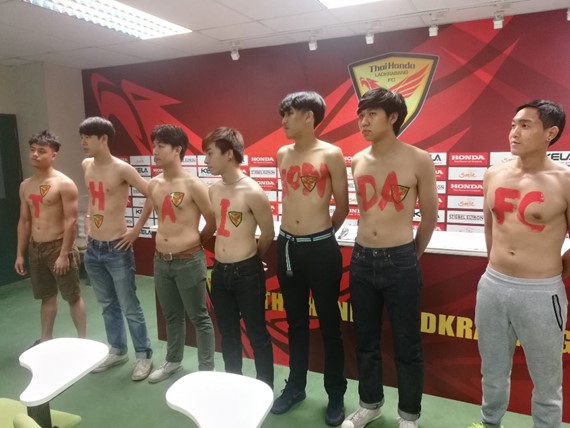
In common with the practice I had seen at other games, even though the match was off, the players still made their way to the support on the uncovered side to make their ritual “thanks for coming”.
The taxi driver who took me to the stadium, said he would come back for me. I was uncertain as to whether this would happen, but not only did he come back, but he made it there around 30 minutes before the agreed time, meaning I did not have to wait long. Anyone else trying to get a taxi here needs to consider asking them to pick up after the game. You are at least a mile from the main road, with little chance of seeing a taxi before you reach it. I did not see many until we reached the centre of Minburi – a distance which would have required more than an hour of extra walking.
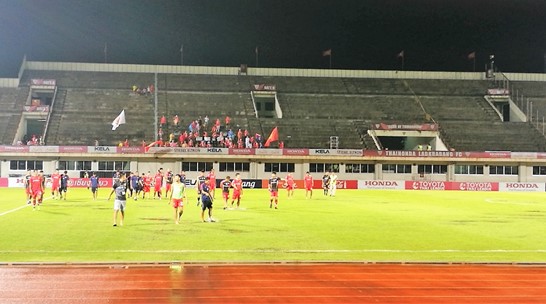
We also picked up two Thai supporters who were looked for a Taxi. Apparently, they had tried to stop my cab when he was on the way in, and he asked my permission to pick them up. They knew little English (despite having visited England – apparently London is cold in winter), and travelled on in the cab after I reached the hotel – so they were going a long way, so they spent at least an hour in the taxi. What they would have done, or what I might have done, without the taxi remains a matter of speculation.
Anyway, I was back in town allowing a drink before bed. In the morning, the hotel staff helped me in the unusual task of transliterating the Thai script on the fifth level team lists for my records. I had managed to get a few sorted and some sort of translation is possible using google, particularly when the name does not translate into English words. As I have found a couple of times in the past, in Thailand and Hong Kong, hotel staff are quite happy to help with unusual requests like this so long as you can make yourself understood and you pick a quiet time of day.
After that though, there was nothing to do but to head back to the airport and board my flight back to London. My flight out was my first on the Airbus A380, but the return was my first on an A350. To be honest, there is very little to say about either from economy class. But my last job was working automating the production procedures for A350 wing panels, so one felt a little more connected here.